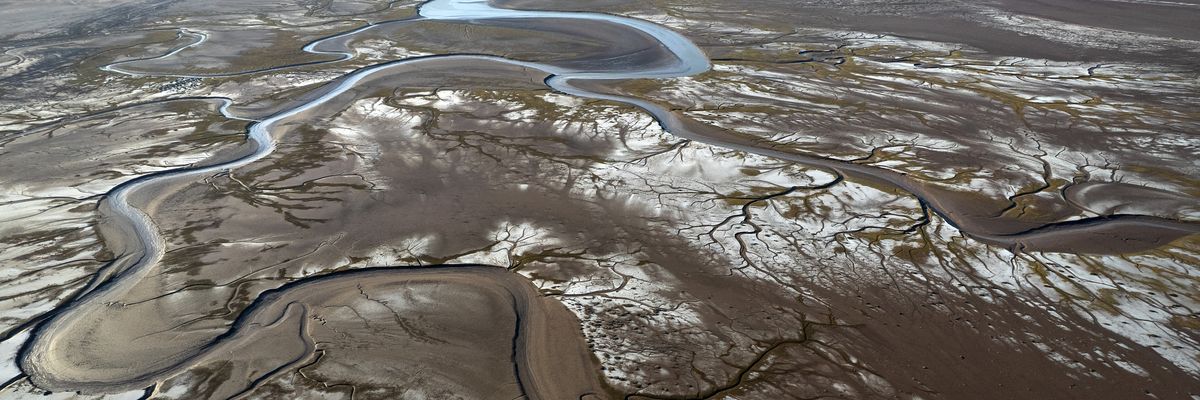
Aerial view of the Colorado River delta meeting the Cortes Sea at Valle de Mexicali, Baja California state, Mexico, on April 4, 2025.
Driven by Groundwater Depletion, Colorado River Basin Has Lost Equivalent of Underground Lake Mead
"Everyone in the U.S. should be worried about it, because we grow a lot of food in the Colorado River Basin, and that's food that's used all over the entire country."
The authors of a new study on water loss in the Colorado River Basin say "large-scale industrial farming" is closely tied to a major depletion of groundwater in the Southwest, where the pumping of groundwater is largely unregulated.
Researchers at Arizona State University used satellite data to measure groundwater supplies across the basin, which runs through seven states including Arizona, California, and Utah.
Measuring the Earth's gravity field to estimate the mass of underground water in the region, they found that the area has lost 27.8 million acre-feet of groundwater since 2003—roughly the same volume as the capacity of the nation's largest reservoir, Lake Mead.
The loss of groundwater has especially accelerated in the past decade, and the basin lost more than twice as much groundwater since 2003 as the amount of water taken out of reservoirs.
"Groundwater is disappearing 2.4 times faster than the surface water," Jay Famiglietti, the senior author of the study and a hydrologist at Arizona State University, told The Guardian.
Groundwater pumping is unregulated in much of the region, and the researchers noted that parts of the basin that have experienced the greatest losses are in areas with industrial alfalfa farming operations.
"Groundwater is disappearing 2.4 times faster than the surface water."
"Overpumping" is the main driver of groundwater loss in the past two decades, Famigletti said. "There's nothing illegal about it, it's just unprotected."
The Colorado River provides water to about 40 million people and millions of acres of farmland.
"Everyone in the U.S. should be worried about it, because we grow a lot of food in the Colorado River Basin, and that's food that's used all over the entire country," Famigletti told The Guardian.
While groundwater has been depleted, hotter temperatures fueled by the burning of fossil fuels have also contributed to especially arid conditions in the region over the past two decades. Since the beginning of the century the Colorado River's natural flow has been 13% lower than it was in the middle of the 20th century.
"We need to recognize where all this is happening and work with the state to put the brakes on," Famigletti told The Washington Post. "We used to say the Colorado River is the lifeblood of the western United States, but now it's becoming groundwater is the lifeblood."
States in the region were forced to reach a federal agreement in 2023 to limit water usage and try to protect the river's supply.
The more water that is lost from the river, Famigletti told the Post, "the more pressure there's going to be on the groundwater" in the basin.
"And then," he said, "it becomes a ticking time bomb."
An Urgent Message From Our Co-Founder
Dear Common Dreams reader, The U.S. is on a fast track to authoritarianism like nothing I've ever seen. Meanwhile, corporate news outlets are utterly capitulating to Trump, twisting their coverage to avoid drawing his ire while lining up to stuff cash in his pockets. That's why I believe that Common Dreams is doing the best and most consequential reporting that we've ever done. Our small but mighty team is a progressive reporting powerhouse, covering the news every day that the corporate media never will. Our mission has always been simple: To inform. To inspire. And to ignite change for the common good. Now here's the key piece that I want all our readers to understand: None of this would be possible without your financial support. That's not just some fundraising cliche. It's the absolute and literal truth. We don't accept corporate advertising and never will. We don't have a paywall because we don't think people should be blocked from critical news based on their ability to pay. Everything we do is funded by the donations of readers like you. Will you donate now to help power the nonprofit, independent reporting of Common Dreams? Thank you for being a vital member of our community. Together, we can keep independent journalism alive when it’s needed most. - Craig Brown, Co-founder |
The authors of a new study on water loss in the Colorado River Basin say "large-scale industrial farming" is closely tied to a major depletion of groundwater in the Southwest, where the pumping of groundwater is largely unregulated.
Researchers at Arizona State University used satellite data to measure groundwater supplies across the basin, which runs through seven states including Arizona, California, and Utah.
Measuring the Earth's gravity field to estimate the mass of underground water in the region, they found that the area has lost 27.8 million acre-feet of groundwater since 2003—roughly the same volume as the capacity of the nation's largest reservoir, Lake Mead.
The loss of groundwater has especially accelerated in the past decade, and the basin lost more than twice as much groundwater since 2003 as the amount of water taken out of reservoirs.
"Groundwater is disappearing 2.4 times faster than the surface water," Jay Famiglietti, the senior author of the study and a hydrologist at Arizona State University, told The Guardian.
Groundwater pumping is unregulated in much of the region, and the researchers noted that parts of the basin that have experienced the greatest losses are in areas with industrial alfalfa farming operations.
"Groundwater is disappearing 2.4 times faster than the surface water."
"Overpumping" is the main driver of groundwater loss in the past two decades, Famigletti said. "There's nothing illegal about it, it's just unprotected."
The Colorado River provides water to about 40 million people and millions of acres of farmland.
"Everyone in the U.S. should be worried about it, because we grow a lot of food in the Colorado River Basin, and that's food that's used all over the entire country," Famigletti told The Guardian.
While groundwater has been depleted, hotter temperatures fueled by the burning of fossil fuels have also contributed to especially arid conditions in the region over the past two decades. Since the beginning of the century the Colorado River's natural flow has been 13% lower than it was in the middle of the 20th century.
"We need to recognize where all this is happening and work with the state to put the brakes on," Famigletti told The Washington Post. "We used to say the Colorado River is the lifeblood of the western United States, but now it's becoming groundwater is the lifeblood."
States in the region were forced to reach a federal agreement in 2023 to limit water usage and try to protect the river's supply.
The more water that is lost from the river, Famigletti told the Post, "the more pressure there's going to be on the groundwater" in the basin.
"And then," he said, "it becomes a ticking time bomb."
The authors of a new study on water loss in the Colorado River Basin say "large-scale industrial farming" is closely tied to a major depletion of groundwater in the Southwest, where the pumping of groundwater is largely unregulated.
Researchers at Arizona State University used satellite data to measure groundwater supplies across the basin, which runs through seven states including Arizona, California, and Utah.
Measuring the Earth's gravity field to estimate the mass of underground water in the region, they found that the area has lost 27.8 million acre-feet of groundwater since 2003—roughly the same volume as the capacity of the nation's largest reservoir, Lake Mead.
The loss of groundwater has especially accelerated in the past decade, and the basin lost more than twice as much groundwater since 2003 as the amount of water taken out of reservoirs.
"Groundwater is disappearing 2.4 times faster than the surface water," Jay Famiglietti, the senior author of the study and a hydrologist at Arizona State University, told The Guardian.
Groundwater pumping is unregulated in much of the region, and the researchers noted that parts of the basin that have experienced the greatest losses are in areas with industrial alfalfa farming operations.
"Groundwater is disappearing 2.4 times faster than the surface water."
"Overpumping" is the main driver of groundwater loss in the past two decades, Famigletti said. "There's nothing illegal about it, it's just unprotected."
The Colorado River provides water to about 40 million people and millions of acres of farmland.
"Everyone in the U.S. should be worried about it, because we grow a lot of food in the Colorado River Basin, and that's food that's used all over the entire country," Famigletti told The Guardian.
While groundwater has been depleted, hotter temperatures fueled by the burning of fossil fuels have also contributed to especially arid conditions in the region over the past two decades. Since the beginning of the century the Colorado River's natural flow has been 13% lower than it was in the middle of the 20th century.
"We need to recognize where all this is happening and work with the state to put the brakes on," Famigletti told The Washington Post. "We used to say the Colorado River is the lifeblood of the western United States, but now it's becoming groundwater is the lifeblood."
States in the region were forced to reach a federal agreement in 2023 to limit water usage and try to protect the river's supply.
The more water that is lost from the river, Famigletti told the Post, "the more pressure there's going to be on the groundwater" in the basin.
"And then," he said, "it becomes a ticking time bomb."

